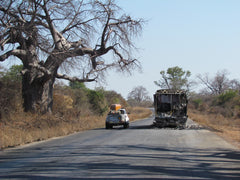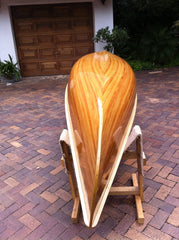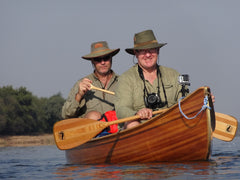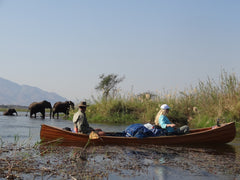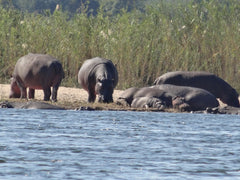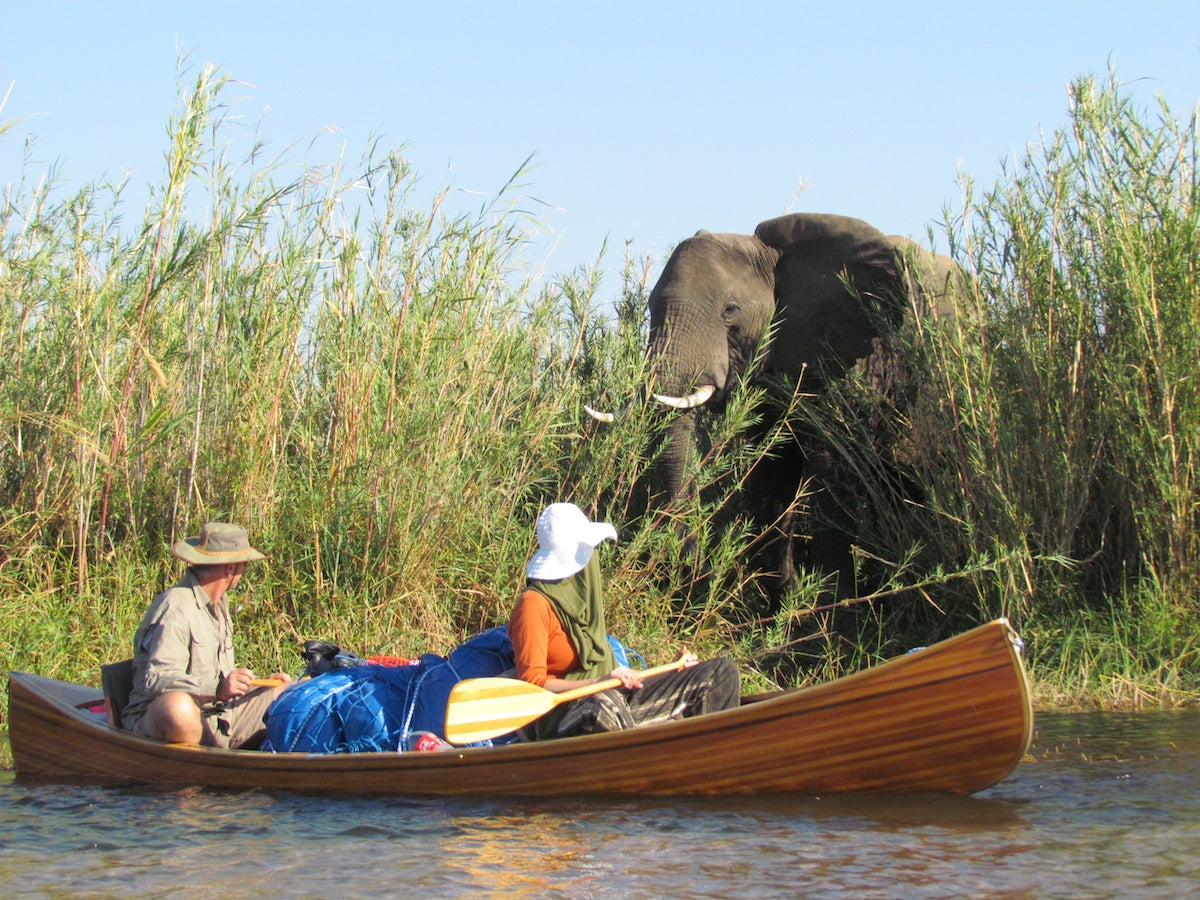An African Canoe Story by Graham Haird, Crown Mines, South Africa
By Graham Haird
My story starts on the Zambezi River, a wild and untamed place, teeming with hippopotami and crocodiles and forming the border between Zimbabwe and Zambia in Southern Africa. About 25 years ago, before the days of internet and cell phones (in our part of the world), I undertook my first canoe safari down the Zambezi. The canoes were very heavy fibreglass models that had more holes in them than Swiss cheese and copious amounts of duct tape was required to keep the water out and our camping equipment dry.
A typical safari involves spending 4 or 5 days on the river during which time the group will cover 50 to 80 miles. Overnight camping is on islands in the middle of the river due to the presence of lions and hyenas and other dangerous animals on the mainland.
The hippos are the most constant and dangerous threat as they account for more deaths in Africa than any other wild animal and the Zambezi holds one of the highest concentrations in the world. We estimate that we pass anything between 1500 and 2500 hippos on an average 4 or 5 day safari. With canoes being a silent means of transport the greatest danger is surprising a group and many a canoe has been severely damaged by an angry Bull Hippo. To avoid this a very sharp look out has to be kept and we constantly tap our paddles on the canoes to warn of our approach.
Crocodiles are also a real threat and I have at times seen crocodiles as long as my canoe – they have a nasty habit of disappearing silently underwater leaving the nervous canoeists wondering where they have gone. Needless to say we make sure that no hands or feet trail in the water at any time and never stand on the river side of the canoe when loading and unloading camping gear.
On this trip I happened to be reading an outdoor travel magazine where there was a letter to the editor about wood strip canoes and a recommendation to buy Ted Moore’s Book – Canoecraft. I had never seen a wood strip canoe because there is no canoeing culture in South Africa due to the dryness of the country and the limited waterways available to us. As a hobbyist woodworker, the photo of the canoe in the article had me hooked and I decided there and then to build my own canoe for future Zambezi safaris. The thought of such a beautiful craft with NO holes was all the inspiration I needed.
Locating the book, the timber and even the bead and cove router bits proved significant challenges in themselves. Anyone I asked looked at me blankly and a simple search on the internet was still not an available option. I asked friends visiting America to source the book to no avail so imagine my delight when I chanced upon a lone copy at our local woodwork store.. The rest of the weekend was spent immersed in the book and I immediately moved my focus to sourcing the timber.
Once again my search for the traditional timber suggested by Ted produced blank stares and when I added that I needed it in 16' lengths the timber merchants laughed at me. Eventually I found Douglas Fir in sufficient quantity and length and although not listed as a commonly used timber I had no other options so purchased it hoping for the best.
I clearly remember the excitement of arriving home with the wood and the entire Easter weekend devoted to cutting and moulding the strips.
Then my project stalled and the cut strips stayed stored in my workshop for about 10 years. During that time we moved house and my wife complained that the delicate strips were moved with more care than our furniture.
Those years saw us do another 5 or 6 canoe safaris down the Zambezi and every time I returned I promised myself that this would be the year that I would finish my canoe.
The big day finally came and I retrieved Ted’s book from the shelf, dusted it off and got started. By this time internet had made its way to our part of Africa and I spent many hours on the builder’s forums and had many questions answered by the community of builders.
Once I got started again, the build took about a year. My kids and their friends often helped and laid a strip or two and slowly the canoe took shape.
It was a fantastic experience to see my canoe emerge as I faithfully followed Ted’s guidance.
I have some woodworking experience, so managed that side of the build fairly well, but was very nervous about the fibre glassing. After more internet searches, acquiring the latest copy of Canoecraft and much discussion with a local epoxy supplier I felt ready for this slightly scary challenge.
Friends were enlisted and we worked long into the night to ensure temperatures were dropping and we all celebrated as the dull wood form emerged as a shining masterpiece (in my eyes anyway) as the fibre glassing process unfolded.
Renewed energy saw the completion of all the finishing touches and finally my canoe was ready for its maiden trip on the Zambezi.
As life would have it, a number of years passed before we could organise the trip, but finally the much anticipated day arrived and we made the 1,000 mile journey to our much loved Zambezi River. The safari did not disappoint – my canoe was fantastic and dry inside and we were treated to wonderful sightings of lion, leopard, hyena,buffalo,elephant and of course the ever present hippos and crocodiles. My youngest son caught a 66 pound vundu, a local catfish, giving him the fishing crown for the trip.
I have subsequently used the canoe where ever possible including negotiating white water on a local river and in the canals at our favourite seaside destination where it never fails to draw admiring glances and comments from the other water users. I still to this day have never seen another wood strip canoe in all of my Africa travels.
It has been a wonderful adventure and I am not finished yet – a stitch and glue fishing kayak is currently taking shape in my workshop.
Thanks Ted and I hope we get to meet one day

